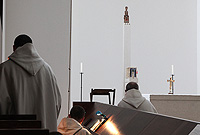To pass on to others the monastic life
To talk of spirituality is for us an anachronism. The notion of Orders having a distinct spirituality from others appeared in the sixteenth century. Our Order was founded in the twelfth century and we follow the Rule of Saint Benedict, written in the sixth century. We do not have spirituality, but rather the desire to redo today that which Saint Benedict proposed to his brothers: to follow the Gospel. To understand how he envisioned this, it suffices to look at the first and last words of the Rule: “Listen… you will arrive…” The path of the Gospel is an entire life open to what God wants to say to the heart of man in order to lead him all the way to Himself. The Rule organizes a school in which one learns to listen to the Word of God. Listening is fundamentally prayer, which is neither chit-chatting nor examining our feelings. The Word of God is heard equally in the chant of psalms during the divine office; it is obviously heard in the lectio divina and is put into practice in fraternal life. All of this constitutes an everyday path toward meeting God, a path whose authenticity is verified by several specific points.
Saint Benedict founded a monastery in the south of Italy and we are his inheritors as well as of the first monks of Egypt, Saint Anthony and Saint Pachomius, from the fourth century. To speak of inheritors, one has to have a chain. A tradition passes from those who know to those who do not yet know, from those who have learned to those who learn, so that one day they become those who in turn do the passing on. This passing on is not automatic. It requires a relationship of one to another. It is not a matter of a block to be passed on, like one who receives a ball and then throws it to the next person, and then to the next. It is a matter of a way of life – of listening in order to meet God – that we try to put into practice for ourselves before passing it on to others, because this way of life brings happiness, and in order that they may also receive this happiness: to listen and to get up and walk, each in his turn.
Inside the monastery, the elders pass on to the younger brothers. The abbot, for example, and the novice master pass on to the younger ones what they have received, and, in passing it on, they enrich it, adding their own experience to what they had received. When I entered the monastery, I received from Father Jerome, a monk with forty years of monastic life under his belt, the experience he had acquired. I kept what I could and then I tried to live it, then I passed it on to others. The Father Novice Master received the same thing, assimilated it for himself, and passes it on to his novices in his own way.
If we have the chance and the possibility of passing on, not only inside the monastery, but also to another community, then this is a foundation. This is what has happened with Nový Dvůr. Some young Czechs came here to become monks and we received and formed them. First there was a passing on within the community. Then a segment of that community, Czechs as well as French, left to create their own community. It is like a tree that bears fruit and that can, in addition, give rise to a new tree from an offshoot. It is not a matter of passing on an inert thing from one community to another. It is a matter of passing on a life that is going to take – in a new place, in a new land, and in another climate – its own nature and its own color. Though these two trees are the same type, they are not identical. They resemble each other and yet each has its own personality.
Why did the Czech brothers who came to Sept-Fons remain and make this commitment? This is something that God inspires and that does not come from us. Of course, one can describe the human reasons, but, fundamentally, it is God who gives a young man the desire to be a monk, who leads him to a community so that he can receive an education, learn to listen and to walk, so that, one day, he may make a definitive commitment. We are instruments, poor instruments, more or less perfect and rather imperfect. We have received from God a gift that we do not deserve, but that we are happy to have received.
The ideal of a monk is that he should have his heart turned toward God, that is, in continual prayer. We only attain it progressively, and often at the end of our life. But, every day, the better part of our time is consecrated to prayer: divine office, personal prayer… All that we do is connected to prayer. It becomes truly the heart of our existence. And we can make this testimony: it is for this that we live in the monastery, and without this our life would have absolutely no meaning.



